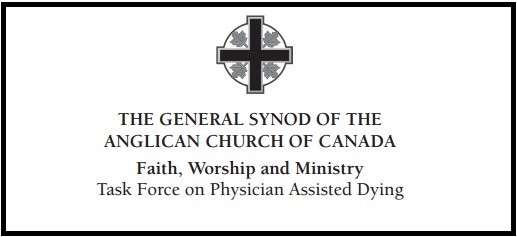The law in Canada changed last year to remove restrictions against physician assisted dying in certain circumstances. The Anglican Church of Canada has now produced a pastoral reflection and resource to assist those accompanying patients, parishioners, and their loved ones through such decisions.
Our faith tradition holds that all life is sacred. This belief is the foundation of all healing ministries. Support for assisted dying seems antithetical to this belief. And yet, for those who seek assisted dying, exploring fully the questions and implications regarding assisted dying often requires a fundamental and deep examination of the meaning and purpose of life for both the one who is seeking assisted dying and the pastoral care provider. Seeking assisted dying is a reflection of the struggle for a quality of life upheld by a deep and abiding belief in the sacredness of life. …
Ultimately, it is not the pastoral care givers belief, nor the traditions or dogma of any faith tradition, nor the hopes and desires of family and friends which will determine the choice of assisted-dying. The final choice remains with the parishioner, informed by their own consciencious appropriation of their faith tradition. Family and friends provide the primary community within which the conversations that shape decisions happen. The pastoral care giver’s role becomes that of spiritual guide or facilitator. It is the pastoral care-giver who reminds and draws everyone’s attention back to the reality that God is present and amongst them sustaining this difficult journey of discernment and choice within God’s embrace of love and grace.
The ACNS quotes Canon Eric Beresford, chair of the task force that produced the report.
Beresford says some people see the new paper as an argument in favour of physician-assisted dying. These people, he says, have “completely misread” the report.
“At this point, physician-assisted dying is a part of our society,” he says. “Now, some churches are going to continue to argue this is a bad, bad thing, and we must stop it. That’s a decision that some churches have made. I suppose our problem with that is . . . what do you do with those members of your congregation who say, ‘Yes, but we believe it’s the right thing for us’? Are you really going to abandon them by simply saying, ‘Well, you know, tough luck – it’s not something you should be deciding,’” he says.
“I don’t think that’s the Anglican way.”
A previous ACC report in 1998 concluded cautiously that it did not support physician assisted dying. “Roughly twenty years later,” the new report continues,
we find ourselves in a changed situation, legally speaking. There have also been significant changes in medical technologies and therapies over these years. Changes in public opinion have followed. …
With the Supreme Court of Canada’s decision in February of 2015 finding that physician assisted dying is constitutionally permissible for a small class of persons, the public debate concerning the legal ban on physician assisted dying is in some ways over. Physician assisted dying will now be an option for competent persons with grievous and irremediable illness who are experiencing intolerable suffering. The societal and legal context within which the pastoral and prophetic ministry of the church takes place has shifted. While many may regret this change, the task force believes that our energy is best spent at this time ensuring that this practice is governed in ways that reflect insofar as possible a just expression of care for the dignity of every human being, whatever their circumstances.
Read more on the church’s response to physician assisted dying here, and access In Sure and Certain Hope here.

